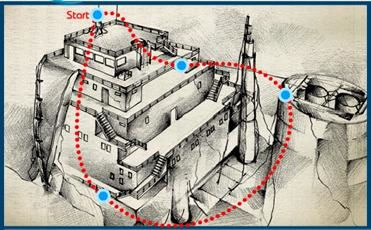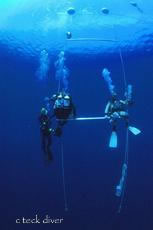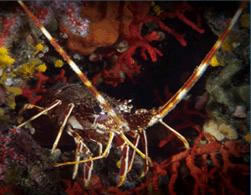|
April 11th, 1991.
During routine operations transferring crude oil from one cistern
to another, a violent explosion occurred on board the Haven, a super
tanker 334 meters long. For
three days, a violent blaze burned tons of crude oil, the ship's bow
section broke off, and the remaining 250 meters foundered one mile
from the inhabited town of Arenzano.
Currently, the wreck of the Haven lies in sailing trim on a muddy
bed 80 meters underwater.
The Haven is currently the largest wreck in Europe, and exploring
it, in observance of all safety parameters, is a fascinating and unforgettable
experience.

Arriving at the dive site, we moor to the large peaks that emerge
on the surface, and we begin our descent following the guide line
that will lead us to the quarterdeck.
The area is not subject to strong currents, but it is advisable to
stay in close contact with the mooring line to avoid distancing yourself
and losing your bearings, which would lead you to descend far from
the wreck to the bed at 80 meters.
Reaching -32 meters at the top of the quarterdeck, we leave the mooring
line and begin our external exploration of the underlying bridges. 
At 40 meters, after peeking inside the large windows of the penultimate
bridge, we cross main deck toward stern, heading for the formidable
smokestack.During this phase, it is important to maintain our depth,
because the main deck bridge below us lies at -55 meters.When we reach
the smokestack, we begin our ascent spiraling around it until we reach
the top at about 32 meters. The walls of the smokestack, like the
rest of the wreck, are covered entirely with large and sturdy oysters,
brightly colored sea anemones and other interesting life forms.
The top of the smokestack was lopped off after the shipwreck to avoid
impeding navigation. It opens below us like a startling abyss, and
shining our flashlights inside we can spot all sorts of lobsters.
Returning to the quarterdeck, we can enter the command bridge, the
only section of the wreck that is prudent to enter, because it offers
easy access.
Carefully observing the recesses and between the pipes we can find
conger eels, spiny lobsters, and shrimp, and while looking out the
ample windows that run along the perimeter of the command bridge we
enjoy an alluring view of the deep surrounding blue, interrupted by
the swift passage of large pelagic fish.
At this point we leave the wreck and begin our ascent along the guide
cable and make our safety stops.
During our dive is easy to see Congers and Spiny Lobsters.The Conger
has an elongated body that is solid and snake-shaped. It has two pectoral
fins located immediately behind its head, and two long fins (dorsal
and anal) that join in the caudal area. Its eyes are large and its
lips fleshy. The conger eel has no scales, and its grey skin, which
is darker on its back, is covered in mucous. It can reach 2 meters
in length. This species feeds at night, capturing large mollusks,
crustaceans and other fishes. During the day it seeks refuge in rocky
recesses and inside wrecks at depths commonly ranging from 10 to 100
meters. But it can be found as deep as 1,000 meters, especially during
its reproductive period.
 The Spiny Lobster is a large benthic crustacean with an elongated
and compressed shape and a cephalothorax covered with spines. The
second pair of antennae is very long and greatly exceed the length
of the body. Its color is reddish brown, dotted and streaked with
yellow and white. This species, adapted for moving by walking on the
hard substrates, can execute rapid backward jumps by taking advantage
of the force of its caudal fan. It is a predator, habitually nocturnal,
and it spends its days in dens in the rocky recesses, from which its
antennae generally stick out. It lives between 15 and 150 meters in
depth, choosing deep water during the winter. It can reach 60 cm in
length. The Spiny Lobster is a large benthic crustacean with an elongated
and compressed shape and a cephalothorax covered with spines. The
second pair of antennae is very long and greatly exceed the length
of the body. Its color is reddish brown, dotted and streaked with
yellow and white. This species, adapted for moving by walking on the
hard substrates, can execute rapid backward jumps by taking advantage
of the force of its caudal fan. It is a predator, habitually nocturnal,
and it spends its days in dens in the rocky recesses, from which its
antennae generally stick out. It lives between 15 and 150 meters in
depth, choosing deep water during the winter. It can reach 60 cm in
length.
|